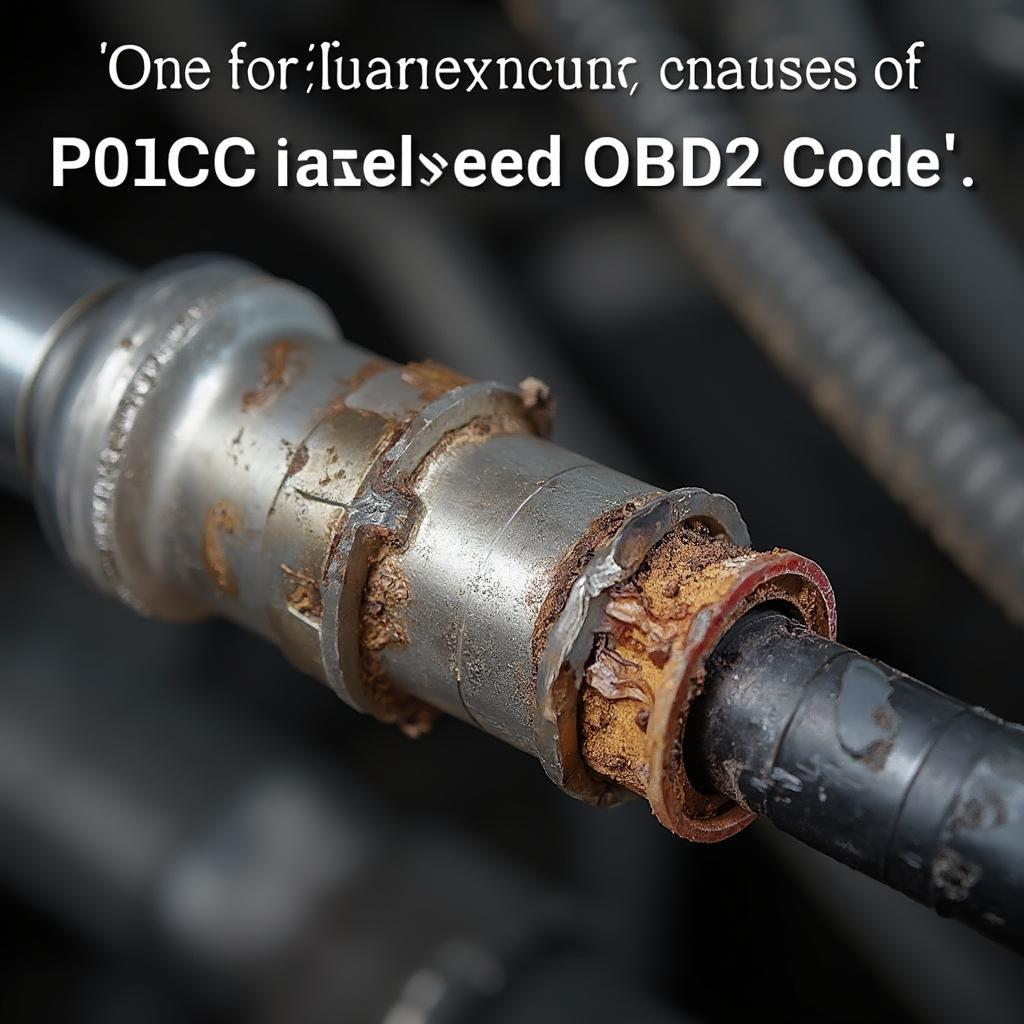The P01CC OBD2 code, often a source of frustration for car owners, indicates a potential issue with your vehicle’s fuel system. This article will delve into the details of the P01CC code, explaining its meaning, causes, symptoms, diagnostic procedures, and potential solutions. We’ll equip you with the knowledge you need to address this trouble code effectively.
What Does the P01CC Code Mean?
The P01CC OBD2 code specifically refers to “Fuel Rail Pressure Sensor ‘A’ Circuit Intermittent Low.” This means the powertrain control module (PCM) has detected an intermittent low voltage signal from the fuel rail pressure sensor. This sensor plays a vital role in monitoring the fuel pressure within the fuel rail, which is crucial for proper engine performance and fuel efficiency.
Causes of the P01CC Code
Several factors can contribute to a P01CC code. These include:
- Faulty Fuel Rail Pressure Sensor: The sensor itself could be malfunctioning, providing inaccurate readings to the PCM.
- Wiring Issues: Damaged, corroded, or loose wiring in the sensor circuit can disrupt the signal.
- Low Fuel Pressure: A genuine drop in fuel pressure, potentially due to a failing fuel pump or clogged fuel filter, can trigger the code.
- Fuel Leaks: Leaks in the fuel system can lead to pressure drops and consequently the P01CC code.
- PCM Problems: In rare cases, a faulty PCM can be the root cause, though this is less common.
Symptoms of the P01CC Code
While the check engine light is the most obvious symptom, other signs may accompany the P01CC code. These can include:
- Rough Idling: The engine may idle erratically or stall.
- Reduced Fuel Efficiency: You might notice a decrease in miles per gallon.
- Hesitation or Stuttering on Acceleration: The engine may hesitate or stutter when accelerating.
- Loss of Power: In severe cases, the vehicle might experience a noticeable loss of power.
Diagnosing the P01CC OBD2 Code
Diagnosing the P01CC code requires a systematic approach. Start by using an OBD2 scanner to confirm the code. Then:
- Visually Inspect Wiring and Connectors: Look for any obvious signs of damage, corrosion, or loose connections in the fuel rail pressure sensor circuit.
- Check Fuel Pressure: Use a fuel pressure gauge to verify the fuel pressure is within the manufacturer’s specifications.
- Test the Fuel Rail Pressure Sensor: Test the sensor’s voltage output using a multimeter to determine if it’s functioning correctly.
- Inspect for Fuel Leaks: Carefully examine the fuel system for any leaks.
Fixing the P01CC Code
The solution to the P01CC code depends on the underlying cause. Potential fixes include:
- Replacing the Fuel Rail Pressure Sensor: If the sensor is faulty, replacement is usually the most effective solution.
- Repairing Wiring Issues: Repair or replace any damaged, corroded, or loose wiring in the sensor circuit.
- Addressing Low Fuel Pressure: This might involve replacing a failing fuel pump, cleaning or replacing a clogged fuel filter, or fixing fuel leaks.
“Regular maintenance and prompt diagnosis of OBD2 codes like the P01CC are crucial for preserving your vehicle’s performance and longevity.” – John Davis, Certified Automotive Technician
Conclusion
The P01CC OBD2 code signals a potential problem with your vehicle’s fuel system. By understanding the code, its causes, symptoms, and diagnostic procedures, you can take the necessary steps to resolve the issue and restore your vehicle’s performance. Using a quality OBD2 scanner is essential for accurate diagnosis and timely repair of the p01cc issue.
FAQ
- What is the P01CC code? It indicates an intermittent low voltage signal from the fuel rail pressure sensor.
- What causes the P01CC code? Causes include a faulty sensor, wiring issues, low fuel pressure, and fuel leaks.
- What are the symptoms of the P01CC code? Symptoms can range from rough idling to loss of power.
- How do I diagnose the P01CC code? Use an OBD2 scanner, visually inspect wiring, check fuel pressure, and test the sensor.
- How do I fix the P01CC code? Fixes depend on the cause and may include replacing the sensor, repairing wiring, or addressing low fuel pressure.
- Can I drive with the P01CC code? While you might be able to drive, it’s recommended to address the issue promptly to prevent further damage.
- How much does it cost to fix the P01CC code? The cost varies depending on the underlying cause and repair required.
Need help with P01CC or other OBD2 codes? Contact us via WhatsApp: +1(641)206-8880, Email: [email protected]. Our 24/7 customer support team is ready to assist. You can also find more helpful articles and resources on our website.
